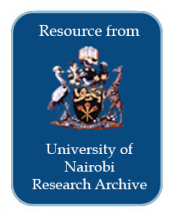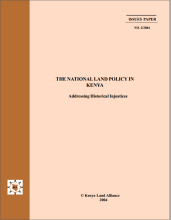/ library resources
Showing items 1 through 9 of 65.The various legal, political, economic and social perspectives that have influenced the land reform discourse in Kenya are examined.
For historical reasons, Kenya inherited a highly skewed system of land ownership at independence in 1963. British colonialism in Kenya was not merely administrative.
The Land Sector Non State Actors (LSNSA) is a network of civil society organizations working together to promote secure and equitable access to land and natural resource for all through advocacy, dialogue and capacity building.
The Historical Injustices Issues Paper seeks to present the various historical land claims issues and perspective related to them and consequently proffer policy statements for their redress.
The Civil Society commends the Ministry of Lands for spearheading the important process of developing the Draft National Policy, and affirms that land is central to the livelihoods of most Kenyans and as such its access, use, ownership, administration and distribution
kenya land alliance download :Memorandum On Continued Engagement With The Ministry Of Lands On Land Reforms Presented To: The Ministry Of Lands.
The consultancy required a Project Completion Report of DFID’s support to the Kenya Land Alliance (KLA) and advice to DFID on possible future activities that would support pro poor land reform in Kenya.
The first set of the land laws were enacted in 2012 in line with the timelines outlined in the Constitution of Kenya 2010.
Pagination
Land Library Search
Through our robust search engine, you can search for any item of the over 73,000 highly curated resources in the Land Library.
If you would like to find an overview of what is possible, feel free to peruse the Search Guide.








